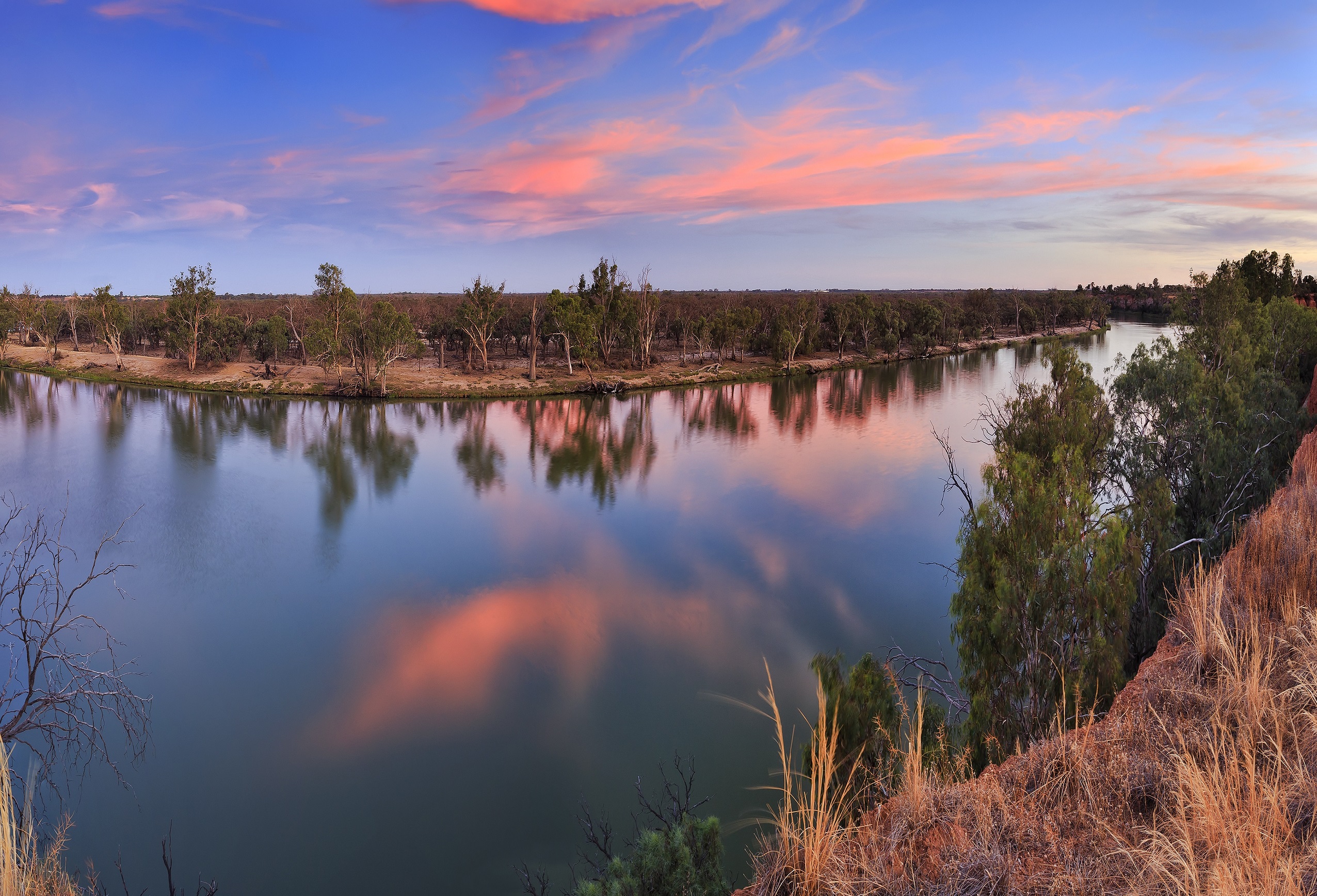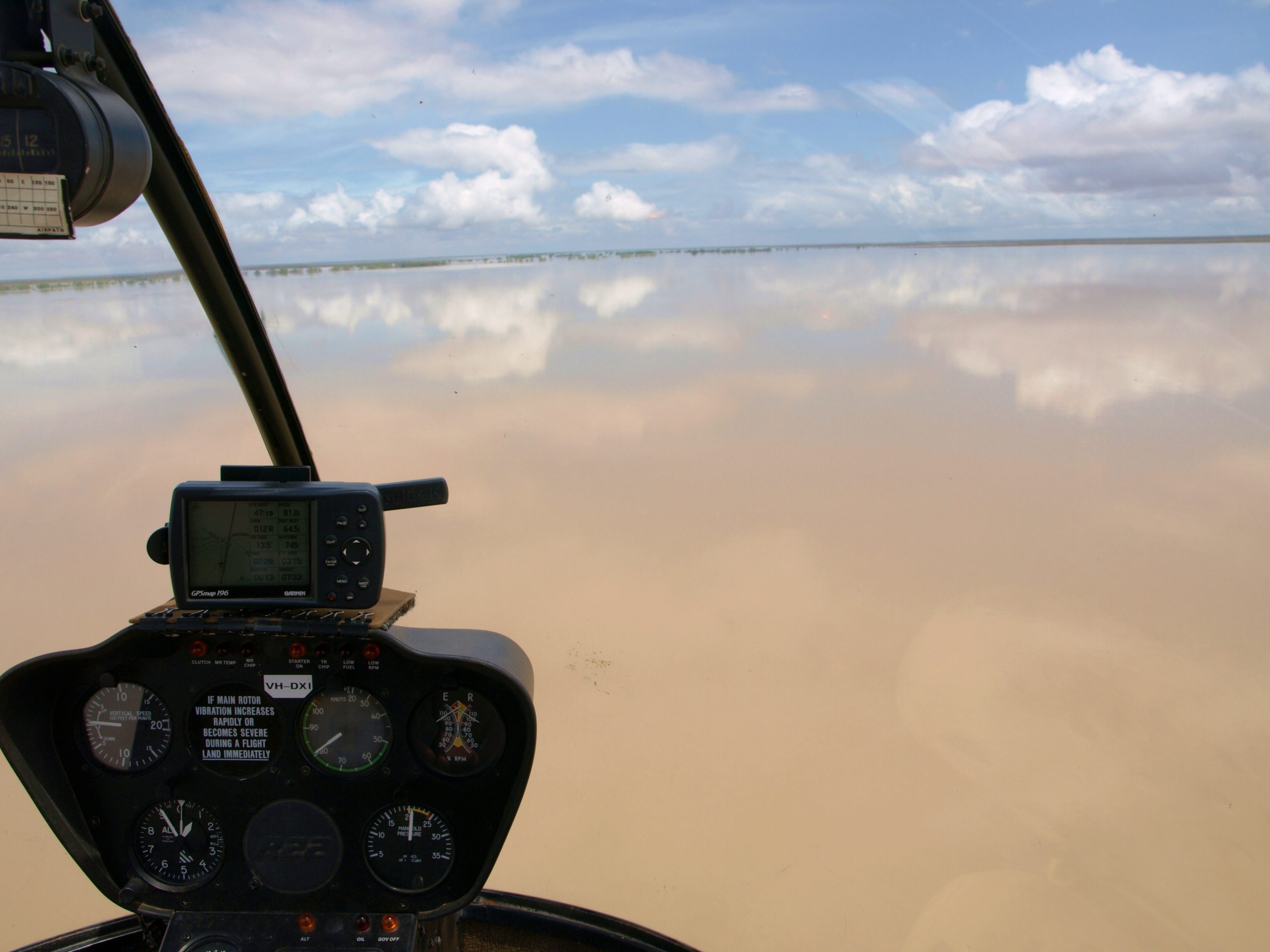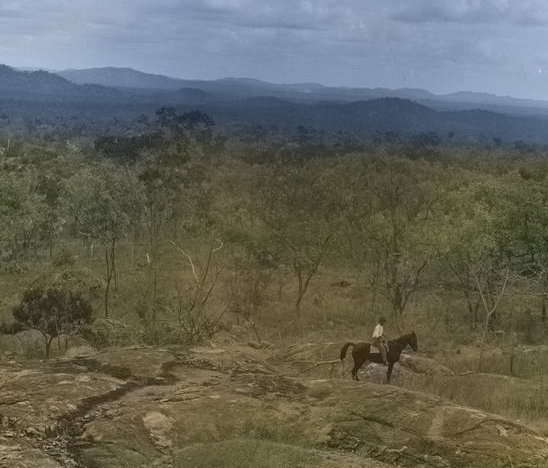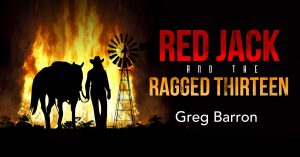
The last leg of the journey to the Katherine covered mile after mile of flat woodland. Tommy the Rag entertained himself by flicking his stockwhip at the tops of termite mounds along the way, and Bob Anderson sang as he rode, old Scottish songs, that strangely seemed not out of place in the Territory.
The weather was steaming hot, however, and most of the others rode in a silence, half asleep and swigging from waterbags, horses and men alike dark with sweat.
In the flat scrub just shy of the river, they stumbled on a round-yard made of cypress posts and rails lashed together with greenhide strips. A neat canvas tent sat alongside. Camp ovens were embedded in the coals of a smoking fire and washing hung from a line.
Working a colt in the yard was the red headed woman, Red Jack. Even through the scrub, for they didn’t dare ride too close, the Thirteen could see the grace of her movements and the concentration in her eyes.
‘There she is again,’ Tom said. ‘What a trip this is turning out to be.’
Not wanting to disturb her, the Thirteen rode on to the river, intersecting it downstream from the township. The green channel lay deep between high clay banks, fringed with a lush growth of pandanus and stately paperbarks. By unspoken agreement they rode on past a colony of flying foxes and stopped to pitch camp on the high bank, where a dry season blaze had left a sharp stubble and green pick coming through for the horses.
‘Where the hell is Scotty?’ asked New England Jack.
‘I’ll ride back and find him,’ said Tom, with a knowing smile.
Retracing their steps, Tom found the big Scot with his horse hitched to a black wattle tree, and Campbell himself leaning on the round-yard rails, watching Red Jack break the colt.
‘Hey there, Scotty,’ said Tom. ‘I thought I might find you back here.’
‘Ah but it’s bleddy poetry,’ the Scotsman replied, ‘watchin’ ‘er work.’
Tom nodded slowly. ‘True enough. I’ve seen a lot of horse breakers, but few have her touch.’
‘I suppose you wan’ me tae gae up now.’
‘It’ll be dark before long. We’ve got plans to make.’
Scotty untied his horse and mounted up, following Tom as he rode off. It seemed to them that Red Jack turned and looked as they went, and they tipped their hats to her as they rode off towards the river.
‘Don’t be getting obsessed with that woman,’ Tom warned.
Scotty wouldn’t look him in the eye. ‘I’m tryin’ Mister Nugent, but a man is only flesh an’ blood.’
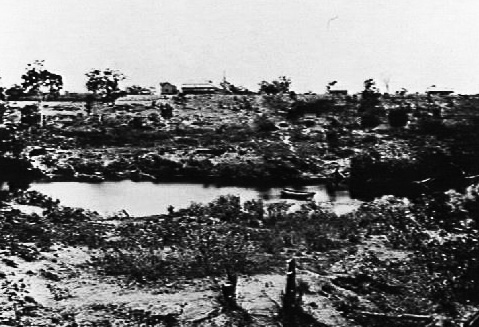
Just before dusk, while Sandy Myrtle and the Brown brothers forded the river and rode off towards Springvale Station in search of a ‘lost’ bullock that might be shot and butchered for meat, Tom took Larrikin, Bob Anderson and one of the stockboys into town. The main purpose was to case out Jim Cashman’s store, but they had pennies for a rum or two jingling in their pockets.
‘Now, if anyone asks,’ said Tom, ‘my last name is Holmes, not Nugent.’
‘And I’m Bill,’ Larrikin said. ‘That’s my real name, but no one knows me by it.’ He turned to Bob. ‘You’re so fresh off the boat no one will know you anyway.’
The Katherine township was a straggling, untidy little outpost; situated on the south bank of the river, at a crossing place named after a prospector called John B Knott. The river’s edge was busy with men fishing, drinking, bathing or washing clothes. Above the water a dirt track that served as a main strip wound through the scrub. There was a pub called the Sportsman’s Arms, owned by Barney Murphy, a couple of stores, and bough-sheds, shanties and tent camps over a few blocks.
The telegraph and police stations were located a few hundred yards away, almost invisible with all the trees, huts, and pandanus clumps. Tom looked warily in that direction. Traps would make their work more dangerous.
Seeing a handy clearing, with old fireplaces marked by scorched stones lying abandoned in the shade, Tom suggested they stop. ‘Pull up here, boys, and we’ll wander around on foot.’
While the stockboy, a wizened character of about fifty years called Blind Joe, guarded the horses, the three white men packed their pipes and strolled along the main street, smoking and talking amongst themselves. They paused at the butcher’s shop to comment on the carcass hanging on a gallows out the back, and exchange hellos with the man in a bloodied white apron weighing beef on a scale, surrounded by a cloud of flies that settled on everything, including the meat.
By a round-about way they reached Cashman’s store. Tom took in every detail: the solid slab construction of the door, the barred grills on the window spaces. Inside they walked between the rows of shelves, enjoying the sight of a variety of goods they had not seen in a long while. Everything from Lea and Perrins sauce, patent medicines, flour in drums, soap, horseshoes, tinned goods to hardware like axe heads and knives. In a cabinet behind the counter sat a selection of Winchester and Martini-Henry rifles, a couple of shotguns and Colt revolvers in wooden cases.
Tom purchased some pipe tobacco and a packet of .577 cartridges so as not to seem suspicious, then led the other two back out onto the roadway. ‘I think I’ve got a plan,’ he said.
‘Ha’ aboot another plan, eh?’ said Bob Anderson. ‘We could just buy what we need, wi’out havin’ to pan in windaes and doors, then be on our way tomorra without any bastard chasing us.’
‘Where’s the fun in that?’ countered Tom. ‘Besides, we’re going to need every cent we can lay our hands on when we get to Hall’s Creek. What now, you blokes, how about a quick peg or two at the pub?’
Without any further urging they crossed the road to the pub, a slab hut with drinkers spilling out on to the street. Tom led the way inside, and as soon as his eyes adjusted he stopped dead. For there, right in front of him, sitting at a table with a glass of rum, was Maori Reid. Beside the half-drunk spirit sat a pile of coins and a grimy old pack of playing cards.
Also at the table was an Aboriginal youth. He looked to Tom like a Jangman from the Roper. There was also something familiar about him.
Tom would have turned and left, but other eyes had already been raised. Thinking furiously, he walked on past Maori without a word and fronted the bar, where he bought three rums. He led Larrikin and Bob, armed with a glass each, back to the table where Maori Reid sat.
‘Hello there, sir,’ he said. ‘Are these seats taken.’
‘Not at all,’ said Maori Reid smoothly. He extended a hand, ‘Nice to meet you Mr …’
‘Holmes, Tom Holmes.’
‘I’m John Smith,’ replied Maori, just as smoothly.
The attention of the rest of the bar had moved on, and Maori Reid smiled and lowered his voice. ‘I’ve just been gettin’ the good oil from Billy here. Your friends Searcy and O’Donahue are on their way. They might get here at any minute.’ Then, in a whisper, ‘I’m thinkin’ that you and your “gang” won’t have the ticker to knock over Cashman’s store with a couple of pinks around?’
Tom ignored the veiled insult, ‘What about the Katherine traps, are they in town?’
‘No, there’s only one, and he’s out on patrol. Not expected back for a week or two.’
Tom turned his attention to the black youth Maori had identified as Billy. ‘Do I know you from somewhere?’
Billy shrugged and looked scared.
Maori sucked in his lip. ‘Billy’s the one who rode off on Matt Kirwan’s horse out at Abraham’s Billabong, when youse were knocking off that beef. That means he’s on the cross – one of us now.’
Tom snapped his finger. ‘I knew I’d seen him before.’ He turned to the boy. ‘So that’s where you met “Mr Smith” here.’
‘Yes malaka. Last time I seen this feller he was hangin’ up wrong way.’
Tom laughed, then threw down his rum in one draught. Larrikin and Bob followed suit. There was no question of staying for another with the brooding presence of Maori Reid in the pub.
‘We’re off,’ Tom said. He extended a hand. ‘Nice to meet you, Mr Smith.’
‘Likewise, Mr Holmes.’
They walked outside, and when they reached the horses, the three men knocked out their pipes and stood taking a last look at Cashman’s store.
‘Are we still going to rob the place?’ Larrikin asked. ‘It might not be so easy if those two traps get here in time.’
‘Of course we’re still going to do it. I don’t mind old Searcy and O’Donahue being around. It’ll add to the fun.’
Tom turned to the stockboy who had been waiting with the horses. ‘You orright Blind Joe?’
‘Yeah I’m orright, boss.’
‘When we get back to camp I want you and the rest of your mob to clear out straightaway.’
‘What for boss?’
‘We got things to do and don’t want you mob mixed up in it. You take the others west, you know the junction, where the Flora River runs into the Katherine?’
‘I know that place boss. Plenty sand, and fish n’ turtle.’
‘You get cracking, walk all night and camp there. We’ll follow tomorra, with full packs of tucker and supplies.’
‘Orright boss.’
The four men mounted up and maintained a lively trot back towards the camp. Each was silent, filled with thoughts of how the events of the coming night might affect his own future.
Continues next Sunday …
©2018 Greg Barron
Whistler's Bones by Greg Barron is available at all good book outlets, Amazon, iBookstore and ozbookstore.com Camp Leichhardt by Greg Barron is also available from Amazon and ozbookstore.com Galloping Jones and Other True Stories from Australia's History is also available from Amazon, iBookstore and ozbookstore.com
